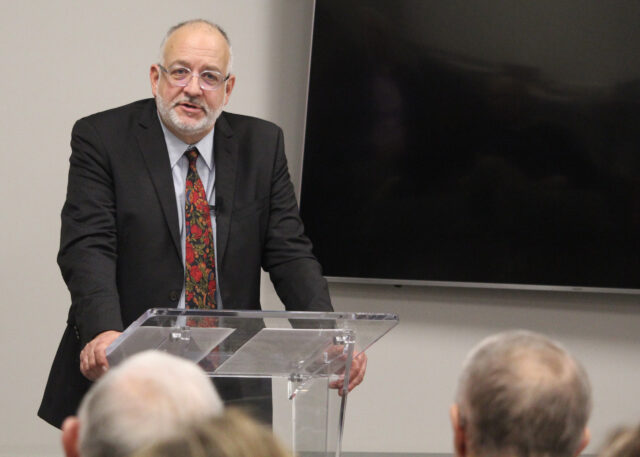
WILMINGTON — The proliferation and increasing depth of artificial intelligence risks robbing people of certain characteristics that make them human, a professor of religion and philosophy said Nov. 24 during an appearance in Wilmington.
Michael Hanby, an associate professor at the Pontifical John Paul II Institute for Studies on Family and Marriage, delivered the Archbishop Edmond J. FitzMaurice Fall Lecture for the St. Thomas More Society, an organization for Catholics in the legal profession. The talk was entitled, “The Artificial God: AI and the Danger of a Posthuman Future.”
“There are, of course, wildly divergent opinions of where this artificial god will lead us, ranging from the apocalyptic to the reassuring,” Hanby said at the beginning of his 45-minute talk. ”I don’t find such reassurances very reassuring.”
There seems to be little doubt that AI will have enormous impacts on employment and could reshape entire industries, he said. Those involved with so-called “brain work,” who spend much of the day behind a laptop, could suffer the same fate as assembly workers from a generation or two ago.
On the other side, there are those who maintain that artificial intelligence is just a tool. The key, Hanby said, is how it is used.
“The important thing is that this tool be used by good people, for good and moral purposes, instead of evil ones,” he said.
All of us imagine that we are the good people, and that we can handle the incoming storm.
“This is like saying a tsunami warning can stop a tsunami,” he said. “It’s difficult to see how we can resist the technology that is so rapidly interposing itself between us and the reality outside of us.”
Lesser technologies have made once-normal activities seem like a chore. Interacting with a bank teller, or making a trip to a brick-and-mortar store, for example, are far less common than they once were.
Other people offer a different kind of assurance, Hanby said. Those folks say that AI will end up like other technology that had similar hype.
“People my age have been waiting for flying cars since the days of The Jetsons,” he said.
People of a certain age have a choice about whether to partake of this technology because we remember life without it. In the not-too-distant future, there will not be people around who remember life without the Internet or smartphones or artificial intelligence. They will accept the technology similar to how previous generations accepted the automobile and electricity, Hanby said.
He continued that even though we can choose not to participate, that choice comes with a cost no matter which way we go. The choice to have a smartphone or to be on social media “is increasingly a choice about whether to be a person in the virtual public square that has replaced the real one.”
Artificial intelligence helps us access more information than we could ever possibly digest, he said. AI anticipates and completes our thoughts.
“It’s conquest will be invisible to those who are conquered by it,” he said.
Whatever its limitations, AI is already a great success, Hanby said. And success replicates itself. The issue is that nothing entraps like success. As it encroaches further into our lives, there could be more costs. Some futurists envision life where humans lose their economic value and will be helpless against sophisticated cyberattacks that affect every aspect of our lives.
Some others imagine a world where AI has replaced human teachers. These interactive algorithms, which are already in development, will teach and, at the same time, study students and know who they are. Medical diagnoses could be made by AI, which would synthesize symptoms and compute all possible treatments, Hanby said. And robot pharmacists, which already exist, would know what medications people take and fill prescriptions without any mistakes.
Already, we have seen some social and psychological changes in people. People are alienated from one another. And the public square, replaced by a virtual model, is where they used to get to know one another.
Our competence also is suffering. Hanby said he can remember the phone number of the girl he had a crush on when he was a teenager, but he doesn’t know his sons’ phone numbers. GPS has dulled our sense of direction.
“I worry more about the effects of our mundane encounters with AI,” he said.
Machines, he said, demand that we serve them. What happens to our minds when they are subject to an ever-present but invisible machine that encroaches on every facet of our lives, “a machine that remembers, anticipates and finishes our thoughts, a machine that presents us an offer to spare us not only the labor of thinking, but of learning?”












